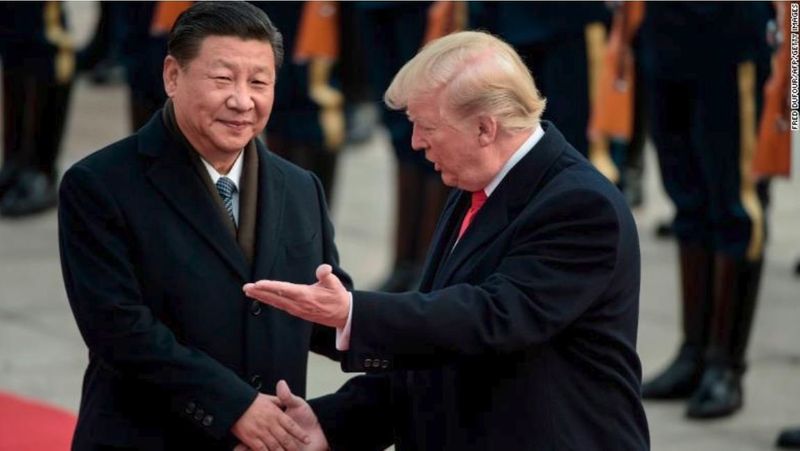Media Report

- CNN reports: "For President Donald Trump, foreign policy is all about the deals that are ripe to be done and the powerful men who make them. So while it seems illogical that someone who won power accusing China of stealing American jobs now wants to save US-sanctioned technology firm ZTE to rescue Chinese jobs, the move is perfectly compatible with his character. ZTE's fate is evolving into a multi-layered drama that encapsulates tense trade posturing between two economic superpowers that are also locked in high-stakes geopolitical maneuvering over the future of a nuclear North Korea. It offers fresh insight into Trump's way of doing business, his willingness to flout the norms of presidential governance and his own impulsive behavior -- all of which proved so attractive to voters soured on establishment politics in 2016."
- The Wall Street Journal reports: "The Trump administration's campaign to reduce trade imbalances with China highlights a gulf between the world's two largest economies over import duties on everything from aircraft to electric toothbrushes. Senior White House economics officials visited Beijing this month to kick off negotiations in the trade dispute, in which the U.S. is pressuring China to reduce its bilateral trade surplus by $100 billion a year. Vice Premier Liu He is expected to arrive in Washington to pursue talks Tuesday, coinciding with the first of three days of U.S. hearings for companies affected by tariffs on Chinese imports. Among the American officials' demands was for China to reduce tariffs on non-strategic imports to levels no higher than corresponding products in the U.S."
- CNN reports: "China has a plan to lure its biggest companies back home. In recent years, some of the top names in Chinese business have chosen to go public on stock markets outside the world's second largest economy. Two of the country's leading tech companies, Alibaba (BABA) and Baidu (BIDU), trade in New York. Another, Tencent (TCEHY), is listed in Hong Kong, whose markets are largely separate from those on the mainland. Beijing wants that to change. "It basically comes down to pride and control," said Andrew Polk, founding partner at research firm Trivium China. "Chinese regulators don't like the fact that some of their marquee companies have listed overseas." China's domestic stock markets have made themselves less attractive for some companies through a range of stringent requirements."
Calendar
- 2018-05-14 Trump throws ZTE curveball as big week for US-China trade begins
- 2018-05-13 Trump orders U-turn over sanctions against Chinese telecom group
- 2018-05-11 How China is working hard to be less reliant on US farmers
- 2018-05-10 China Draws Up a Shopping List of American Goods to Avoid Trade War
- 2018-05-09 China is the big wild card in Trump's Iran decision
- 2018-05-08 Kim’s Second Surprise Visit to China Heightens Diplomatic Drama
- 2018-05-07 China's trade imbalance with U.S. a long-term problem, says central bank governor
- 2018-05-06 Trump may have no Plan B on trade
- 2018-05-04 China denies pointing powerful lasers at U.S. aircraft
- 2018-05-03 Trump praises China's Xi as trade talks begin in Beijing
News
- CNN Trump, China, ZTE and the art of the deal
- The Wall Street Journal A World Apart: Charting the Gulf Between Chinese and U.S. Tariffs
- CNN China wants its top tech firms to bring their shares home
- Financial Times China's south-east Asia push threatened by new Malaysia regime
- The Wall Street Journal Chinese Stocks Aren't Normal—Whatever MSCI Thinks
- The Guardian Warning sounded over China's 'debtbook diplomacy'
- ABC News Julie Bishop hits back at former China ambassador Geoff Raby's calls for Foreign Minister's sacking
- The Wall Street Journal Can China's Red Capital Really Innovate?
- The Wall Street Journal China Investigating How Cockpit Windshield Blew Out of Sichuan Airlines Flight
- Financial Times Michael Bloomberg launches China-linked rival to Davos gathering
- Fortune Gap Has Apologized to China for a T-Shirt Featuring an 'Incomplete' Map. What Was It Missing?
Commentary
- The New York Times What Really Happens in China's 'Re-education' Camps
- Huffington Post Trump Orders Help For Chinese Phone-Maker After China Approves Money For Trump Project
- The Wall Street Journal U.S. and China Discussing ZTE and Agriculture Deal, Lies, Damn Lies and Inflation
- JLL Which global cities have the strongest connections to China?
- Investopedia U.S. Tech Firms' $150B China Revenue At Risk in Trade War
- The Wall Street Journal Real Time Economics: Trump's Lifeline to China
- NPR The Gap Apologizes For Shirts Showing Map Of China Without Disputed Territories
- New York Magazine Why Trump Is Suddenly Worried About Saving Jobs in China: 6 Theories
- Popular Science Here's China's plan to compete with SpaceX and Blue Origin
